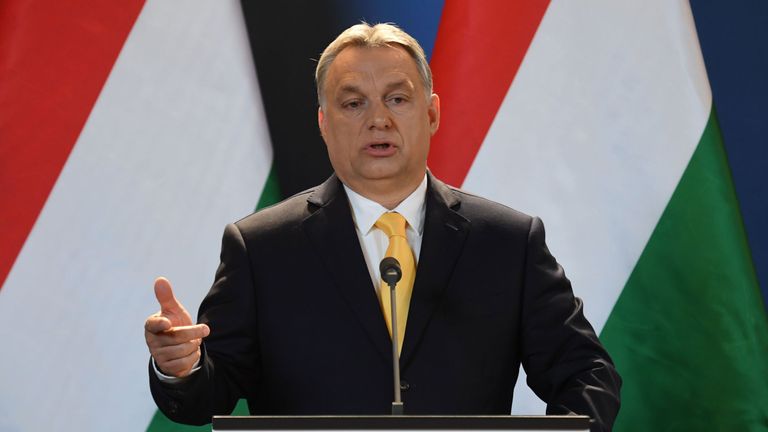Sky Views: Is the EU holding democracy for ransom?

Thursday 3 May 2018 00:50, UK
By Michelle Clifford, Europe Correspondent
If Brexit had led you to believe the European Union is one big happy family of 27 with a lone troublesome relative across the water, think again.
There's a new row brewing and as with many family disputes, it's about money.
Not just who puts in but who gets back from the Brussels' coffers which are set to be dented as the UK walks away and takes its multi billion pound yearly purse with it.
Even before the EU published its new long-term budget plan this week ( an eye-watering 1.28 trillion euros between 2021-2027) the bickering had already started.
Richer nations like The Netherlands were insisting they will pay no more to plug the Brexit gap, France and Ireland were worrying about plans to cut back on farmers subsidies and Hungary and Poland, well that's another story.
The two former communist nations are bracing for one hell of a battle with plans to punish their populist governments financially if they are deemed to have fallen short of the bloc's democratic values.
Both countries have been harshly criticised for increasing state control over the news media and the judiciary.
And Hungary's recently re-installed Prime Minister Viktor Orban - who has also clashed with the EU over refusing to sign up to refugee resettlement programmes - has pledged to push ahead with a crackdown on non-governmental groups.
So what can and should the EU do? Well, the plan is to tie EU funds - which Hungary and Poland do well out of - to abiding by the rule of law and ensuring the independence of the judiciary.
Is the EU right? Should a union which espouses democratic principles even be threatening democratically elected leaders in this fashion?
Well yes, if it forces a member of the EU to adhere to the demands of its treaties which include respect for the rule of law and related institutions.
And in this case could money do the talking? Will the fear of losing critical EU funds force a change of behaviour? That is certainly the ambition.
And it has support from many member states, although the spread of populism and the right could see not only Hungary and Poland challenging but also Austria and who knows, Italy down the line too.
There will be those who will say this is about Brussels' liberals trying to quell the spread of 'illiberal' governments which have legitimately won the support of voters with their populist, anti-immigrant, reform of the EU messages (for the record election observers from the Organisation for Security and Co-operation in Europe said that rights had been broadly respected during the recent Hungarian election).
But can't it equally be argued that this is Brussels forcing leaders who may be different from some of the bigger players in the bloc to adhere to some of the central principles of the European Union including freedom of the press, democratic openness and respect for the courts?



